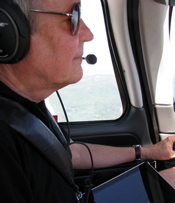From the window of a small plane, the country is a living Norman Rockwell painting

From the time my husband was a boy, he dreamed of learning to fly planes. He finally indulged his passion some 13 years ago, when the moratorium we agreed upon early in our marriage of "not until the kids are grown" ran out. The day our youngest got his college acceptance, my husband announced, "I think I'll head out to Gaithersburg to take a few flying lessons." We bought a single engine, four-seater plane in 2000, sold it when we moved to China to live for 3 years, then traded up to another used 2006 model on our return about a year ago. This plane, a Cirrus SR22, has won its place in my heart for the parachute that is built into the top of the fuselage. Even I, who usually ride shotgun, know how to deploy the chute in an emergency, one that might for example disable the pilot or the plane. I always sleep like a baby the nights before we fly, reassured by the fact of the parachute. Remember those little balsa wood toy planes with the parachute that gently and evenly lowers the whole plane if you drop it? That's the general idea of how it works on our plane.

Owning a plane is about the last thing I ever dreamed of doing, but I appreciate it now for its functionality (visit the grown kids at a moment's notice) and even more for the pleasure as well as the complete disengagement from everyday pressures that it brings to my husband. He's a natural flyboy.
It is hard to justify this plane economically, except if you start calculating the best-case formula for a trip that includes maximum number of "souls on board" (a term used in filing flight plans that always make me pause for a moment), price of last minute commercial air tickets, or driving time. Here's how a scenario like this works: four of us fly from Washington, DC, to Maine and back, costing about $500 in fuel (which is about $1.50 more per gallon than gasoline), taking about two and a half hours. Sometimes the flight is wonderfully efficient, like flying from Washington, DC, to the tip of Long Island, which would take God knows how many hours of driving. More often, it makes no sense at all, except for fun and mental health.
We have taken lots of flights by now, including a three-day cross country trip from our then-home in Berkeley to Boston, where we were delivering an offspring to college one year. We have flown to the Oshkosh Air Show, which is the Holy Grail of flyers' destinations (think Woodstock for 1960s hippies). We have also taken a number of milk runs to nearby beautiful places, like our recent trip to Portland, Maine.
Heading for Portland, the first interesting views over the Washington, DC, area look down on the Amish country of southeast Pennsylvania. If we fly especially low, say about 2500 feet, I can pick out horse-drawn buggies on the roads. Going north, Pennsylvania always surprises me for its reminders of the infrastructure that keeps our country organized and running: rock quarry after quarry, distribution centers thick with orderly swarms of containers backed up to warehouse loading docks, neatly laid out schools looking rich and privileged with football fields and baseball diamonds, nuclear plant towers spewing white plumes of vapor, shopping malls with outsized parking lots.
The beauty of America is astonishing from the air, and always makes me think the Chinese were right when they named America Meiguo, which literally means "beautiful country." They could have just gone with something that sounds close, like Ao-dah-li-ya (Australia) or for something less lovely, like Faguo, "law country," for France. Meiguo is flattering and apt. One early morning flying low over Iowa, I watched a Norman Rockwell painting come to life: a yellow school bus inches down a country road, pauses in front of a big farmhouse surrounded by an emerald-green lawn and white picket fence, then slowly starts up again and mosies along down the road.
Through the mid-Atlantic states are farmers' fields, geometric and marked by different color crops. The mighty Susquehanna is spanned by elegant bridges. Reservoirs are everywhere, and lakes are bordered by forests growing right to the water's edge. Up into New York, West Point sits regally on a bluff, guarding its point over the Hudson.
On a summer weekend day, looking down, all of America seems to be out recreating -- yes, even now, with all the country's obvious economic problems, this is how it looks from above. It's hard to tell how populated are the countless swimming pools, except by the number of cars in their parking lots. In New Jersey, nearly every house in the planned developments has a pool, although by the time we reach Maine, the pools have become fewer and changed from in-ground rectangles to above-ground circles. (If you were a foreigner looking down on America, you would think everyone had a private pool.) Boats leave wakes zigzagging around the lakes. And the air traffic controllers (ATCs) are busy following small planes to all kinds of summer destinations: Cessna to Long Island; King Air to Martha's Vineyard; Mooney to Great Barrington; NetJet and ExecJet pilots with their deep, gravely voices requesting shortcuts to Cape Cod. The ATCs call out warnings to watch for gliders, hot air balloons, aerobatic activity, and jumpers. We see a blimp resting on the ground, full and fat, in a small airport in New Jersey somewhere.
On the way home from Portland,
we encountered a little weather. We watched the storms on our Nexrad radar display, and we could see towering dark clouds out the plane windows. We diverted course a few times to fly behind a cell of thunderstorms. The air traffic controllers were particularly busy but always even-keeled, even facing some drama. Helicopter 952SJ Lifeguard, a medical helicopter, called en route to the Westchester Medical Center, requesting advisories. The ATC responded that there was a level 6 thunderstorm over the Center, and said that no one was landing there. (The radar echo intensity of level 6 is defined by the FAA as ""extreme" with severe turbulence, lightning, large hail, extensive surface wind gusts...") The pilot asked if the storm might be clearing. The ATC responded that the cell was building.
This kind of repartee is not infrequent and always riveting. I expect the other listeners on the frequency feel the tension I do when hearing such exchanges. I've heard ATCs coolly guiding pilots through fires, emergency landings, any number of traffic alerts for nearby aircraft, warnings that airspace is "hot" with military maneuvering, or suggestions to increase altitude or change heading--now. I tracked Helicopter 952SJ as long as I could, until we crossed south into airspace of another controller at a different frequency.
It is such a privilege to enjoy when air travel is not an endurance test, but an adventure.
This piece first appeared on theatlantic.com
here.
(photo from goingslo/Flickr)






 Owning a plane is about the last thing I ever dreamed of doing, but I appreciate it now for its functionality (visit the grown kids at a moment's notice) and even more for the pleasure as well as the complete disengagement from everyday pressures that it brings to my husband. He's a natural flyboy.
Owning a plane is about the last thing I ever dreamed of doing, but I appreciate it now for its functionality (visit the grown kids at a moment's notice) and even more for the pleasure as well as the complete disengagement from everyday pressures that it brings to my husband. He's a natural flyboy.